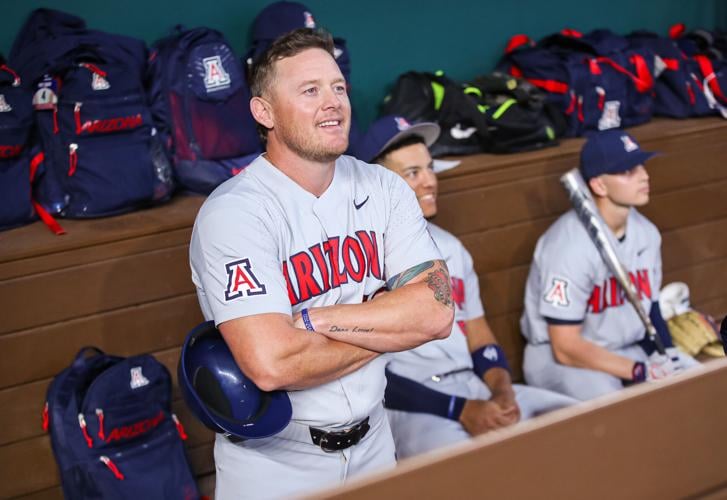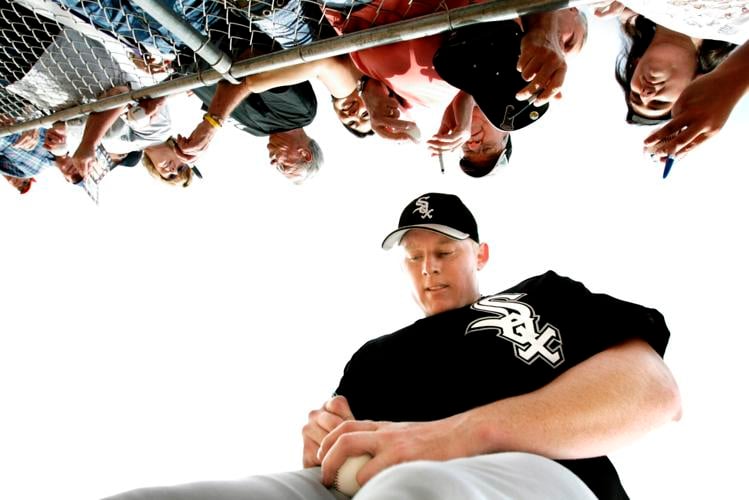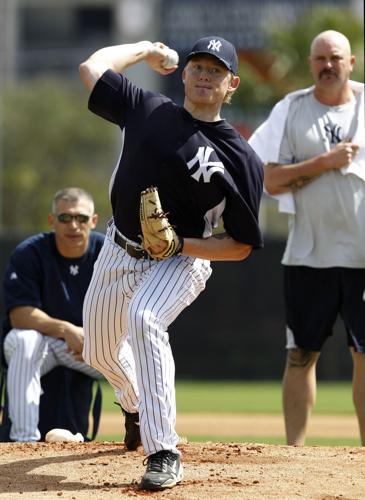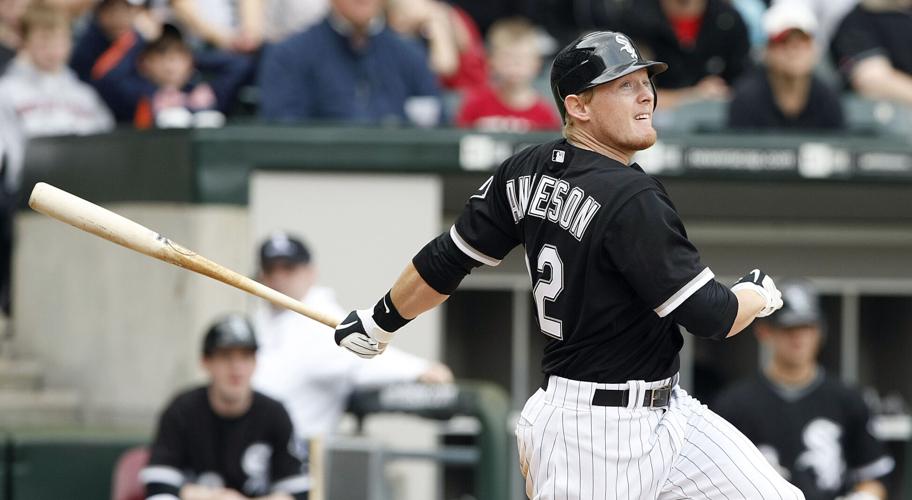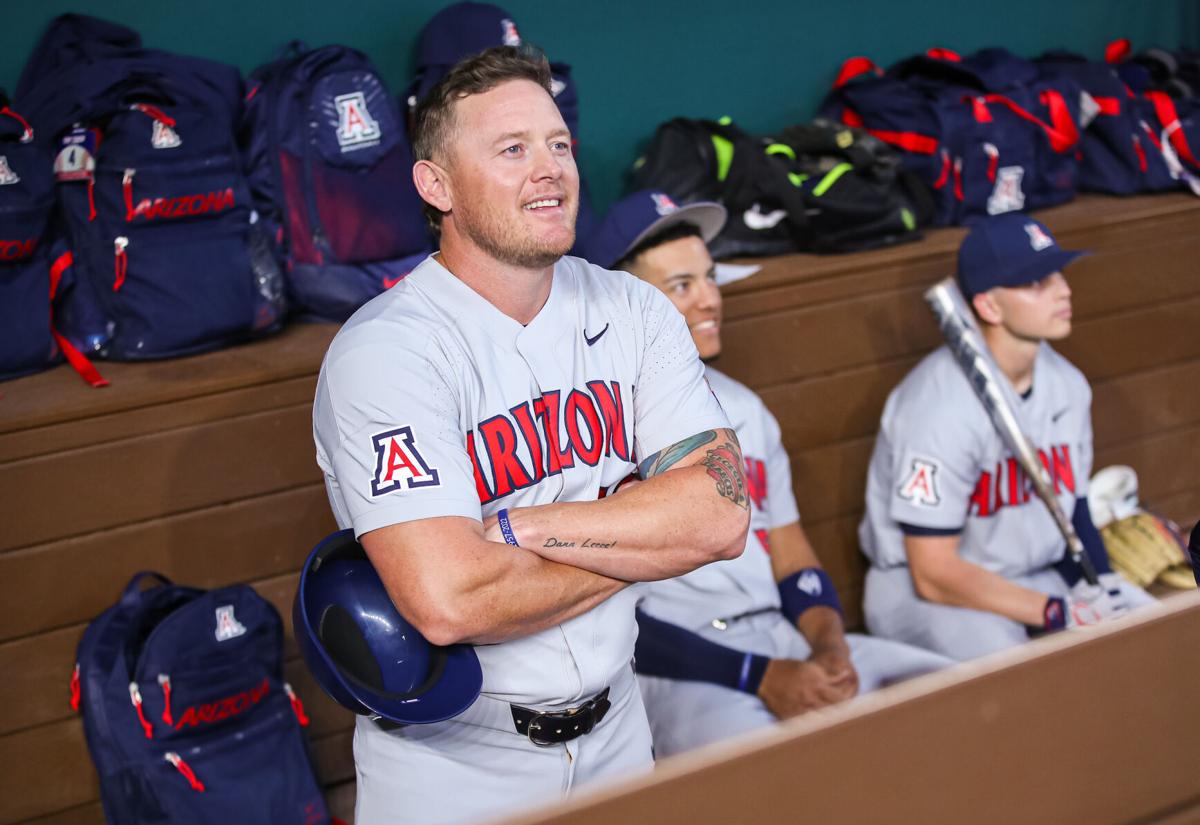ARLINGTON, Texas — Chip Hale wasn’t the only former Arizona baseball star who went back to school last summer.
Shortly after Hale was hired in July — literally minutes into his tenure, in fact — Brian Anderson reached out to the new Wildcats head coach. Anderson wanted to launch a coaching career of his own. What better place than his hometown school under a man he’d known for almost 20 years?
“I looked through my phone, and I was like, ‘Please be there,’” Anderson said Saturday afternoon from the lobby of the team hotel adjacent to Globe Life Field, where Arizona was set to face Oklahoma that night in the State Farm College Baseball Showdown.
“I had his number in my phone. I texted him. I said, ‘Hey, congrats. I’d love to be a part of this.’ He said, ‘Have you graduated yet?’ That’s how it all started.”
Anderson hadn’t graduated, which made him a perfect fit. Every program is allowed to have an undergraduate assistant coach. Former UA pitcher Cameron Ming served that role last season.
So Anderson, a standout at Canyon del Oro High School before his UA days, came home. His mom converted her detached garage into a guest house for Anderson, his girlfriend, Danielle, and their parti poodle, Beau. He’s on track to receive his degree in human and social behavior in May. It’s an essential step in what Anderson hopes will eventually become a career in coaching.
His current role is to tutor Arizona’s outfielders and coach first base. He’s arguably overqualified for both jobs after playing five seasons in the major leagues with the White Sox and Red Sox.
“He’s an ex-superstar here at the University of Arizona,” Hale said, “who’s got a wealth of knowledge about baseball and can help these kids make good decisions when they get into pro ball. He’s been a great asset to us.”
Anderson, 39, has plenty of wisdom to impart after a pro career he described as “underachieving.” The White Sox selected Anderson in the first round of the 2003 MLB draft after he batted .342 across three seasons at Arizona. But Anderson never became a full-time starter, and he played his last MLB game at age 27. An attempted comeback — as a pitcher — was thwarted by an arm injury.
Anderson spoke to the Star about his professional journey, his UA days and other topics. The conversation has been lightly edited.
When you left Arizona in 2003, did you ever think that you would put on a Wildcat uniform again?
A: “Never. Every 21-year-old first-round pick, any pro ballplayer, thinks, ‘I’m going to play pro baseball forever and ride off into the sunset.’ But, man, as you get a little older, a little wiser, you start to evaluate things (differently).”

White Sox center fielder Brian Anderson signs a baseball for fans following a 2006 spring training workout at Tucson Electric Park.
How would you summarize your major-league career?
A: “Underachieving, I think, but with spots of greatness. You look back: ‘What did I do wrong? What could I have done better?’ It’s just natural. I worked hard ... but I think I was just really bad at being a professional baseball player.
“Once I’d reached the major leagues, that was kind of enough; I had reached that pinnacle. I lacked the discipline, the maturity at that time to handle certain situations.
“When I should have gone right, I was going left, and that caused me to lose the drive to keep playing. And then ultimately, you don’t perform, they don’t want you to be on the field anymore.”
Your most memorable moment came against the Twins in the last game of the ’08 season — a diving catch to end the game and send the White Sox to the postseason.
A: “I’ve been milking that one for a while, man. It’s been like 12-13 years.”
What do you remember about that play?
A: “It was Game 163. We were tied with the Twins in the A.L. Central. It was a winner-take-all. A blackout game at home. There must have been 50,000 people there, all wearing black.
“You dive, and you can feel the volume, you feel the place shaking. It’s crazy. That catch was the last out.
“And then we went to the playoffs and got smoked by Tampa. I don’t tell anybody that part.”
You were 27 when you played your last big-league game. That had to be hard to deal with.
A: “That transition’s tough. The irony of that whole story was, I had a monster spring with Kansas City in 2010. It was the best spring I ever had.
“I told myself, ‘Man, I don’t want to be a backup anymore. If I don’t get back to starting, I’ll probably try pitching.’ Trey Hillman (the Royals’ manager at the time) said, ‘Hey, we might need you to start in Triple-A for a couple of weeks or back up Jose Guillen (Kansas City’s right fielder).’ And I just wasn’t on board with that. My 27-year-old brain was like, ‘It’s black and white, it’s A or B.’
“So (I decided that) I’m going to pitch. They sent me down to the minors. I remained on the 40-man (roster), but they weren’t gonna pay me my big-league salary to pitch. I started in rookie ball and made it to Triple-A in Omaha by September. But my arm just gave me too many problems.”
Do you regret that decision? If you had the perspective you have now, would you have accepted being a fourth outfielder?
A: “Oh my god, yeah. But there’s just no way to do that.”

In five big-league seasons as an outfielder, Anderson hit .227 with 22 home runs and 80 RBIs.
What are the biggest lessons to be learned from your professional journey?
A: “I hate that term, ‘Tomorrow is never promised to you.’ But more along the lines of, ‘Hey, don’t always look to the future ... I can’t wait to get to pro ball.’ These are some of the best times, these three games right here. They’ll be looking back on these three games 20 years from now.
“This time with your teammates, going across the street in the freezing cold to work out with your team, that experience and getting to do all that stuff far outweighs ... the accolades that go along with pro ball.”

Brian Anderson switched from outfielder to pitcher late in his pro career. In 2011, Anderson threw batting practice while Yankees manager Joe Girardi, left, and special instructor David Wells looked on.
You played for Jerry Stitt and Andy Lopez at Arizona. How would you compare their styles?
A: “Both very intense. Very different deliveries. Coach Stitt will pierce you with his eyes, his eye contact. Coach Lopez has a way with words. He’s a very creative guy, probably one of the best public speakers I’ve ever met. He can absolutely melt you with his words. Or he can absolutely make you feel like you’re the greatest player in the world.”
You tried a last-ditch comeback with the White Sox in 2015, but that didn’t work out. Then you were in medical sales. Now you’re back in baseball. What did you miss most about it?
A: “The structure. You feed off that. You take that structure away from any of these professional athletes or these premier (Division I) athletes, and you get lost real quick.
“It’s not that you’re being told what to do. But we feed off that regimen, that regimented lifestyle. Structure is good.
“You get bored, and that leads to bad things.”
Do you ever get confused with the other Brian Andersons in the big leagues? Do you have any stories about that?
A: “Brian Anderson (current third baseman) with the Marlins, never, because he’s too far away. The other Brian Anderson (former pitcher with the Diamondbacks and others), all the time. It would be, ‘I know you, you’re a pitcher for the D-backs.’ ‘No, I was supposed to get drafted by them.’ ”
The first Brian Anderson was born in April 1972. You were born in March ’82. The third one was born in May ‘93. Should we just expect a Brian Anderson to come along every 10 years or so?
A: “There’s (also) the catcher with the Cardinals. But he spells his name different. He spells it with a ‘Y’. We don’t claim him.”


